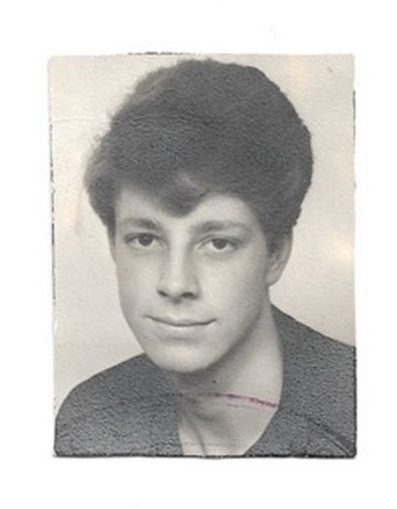
Being born in Birmingham in 1947 I was lucky enough to have ridden on the trams along Oulton Boulevard before they were scrapped in the early 50’s and regularly traveled into central Birmingham on the Outer Circle bus no.11, crossing the cobbled Bull Ring just by Nelson’s statue and St.Martin’s church. We lived in Hall Green with the river Cole running down the rear of the gardens in Sarehole Road. I can recall playing with friends in the stream close by the ford in Green Road and the street party that was for the queen’s coronation in 1953 at which we all received a Coronation mug.
My parents came from two very disparate sections of Birmingham society. My mother’s side included a fairly wealthy grandfather accountant who had acquired some remarkable paintings and artefacts – as well as a number of houses which he rented out. My father’s side were agricultural workers in tied houses on the Ragley Hall Estate until the turn of the 19th/20th century when they moved into back-to-back lodgings near the Kynoch armaments factory in Aston. My paternal grandfather is shown as a lathe turner on the 1911 census and my grandmother had already buried one of her six children by this time. Grandfather Albert enlisted in the Coldstream Guards in early 1915 but was passed as “unfit for service” just two months later. What that unfitness entailed remains a mystery and one can imagine the gossip in the back to backs when he returned home in his civvies. My father had arrived in 1914 but by 1919 my grandmother had died at the age of 36 undoubtedly broken by her work at Kynoch’s and the struggle to keep a large household together. On her death three of the remaining five children were farmed out to relatives. My father went to an aunt and was lucky in having a half-decent childhood away from his own father who it was rumoured was often the worse for drink and could be pretty loose with his fists. Grandad was to die in 1926. Both my paternal grandparents are buried in a graveyard with no markers.
It was chance that found my father starting work as a telegram boy, aged 13, and my mother working in the General Post Office in Birmingham where eventually my father came “off the road” and began a long career as a clerical officer. By 1938 he was in the Territorials and was therefore one of the first to be enlisted into the army at the outbreak of war. Faced with the prospect of years abroad he proposed to my mother and they got married in 1940. My maternal grandfather, an RFC pilot from the First World War initially refused to go to the wedding service. One presumes he was thinking that my father was from the lower classes – one up from the Peaky Blinders – but eventually and grudgingly gave his daughter away but he DID refuse to attend another of his daughter’s wedding. I cannot even imagine what kind of thinking would stop you attending your own daughter’s wedding and it is no surprise that there remained an unspoken animosity between my grandfather and his son in law for the remainder of their lives. In all honesty my maternal grandfather had done virtually nothing in the way of work since he left the RFC and continued to live off the proceeds of his father’s business. Do I blame him? Perhaps a little, but as first a stretcher bearer on the Front and then as an RFC pilot he would have seen and experienced some terrible sights which undoubtedly affected him though the rest of his life. His death certificate simply states as a profession “office clerk” – basically he was given the job of collecting debts from slow-payers of his own father’s accountancy business. The wealth of the family gradually dissipated and on his death all that was left were two houses – one that he lived in and one in Sparkhill that is now owned by a Pakistani family. The art was distributed through the family and while his three daughters were quick to push most of it through auction it was myself and my cousins who hung on to the bulk of the better material.
1953 saw a promotion for my father and an offer to move down to London which he took. I have only realised now that this signalled the first cracks in the extended family all of whom had lived within 3 miles of my grandparents. The glue that kept families in physical touch was beginning to crack in those post-war years and were eventually to reach their apogee with offspring scattered to Dunfermline, Cornwall, New Milton, Sussex, Australia, Mauritius and Malta. The cohesion that had lasted for centuries finally collapsed for the extended family unit through the 60’s and 70’s.
My father continued to climb the executive ladder at the GPO becoming one of those who travelled to mills around the country to inspect Post Office uniform production. He would be away for days in each week travelling by train to all points North and whenever he returned he would bring a little present for my mother – a Wade Whimsies figurine. I have no idea how my mother reacted to these gifts but I remember them strung out on the edge of the book shelves. What happened to them I have no idea. I would receive a Dinky Toy car and very regrettably I too have no idea what happened to what amounted to a decent little collection, complete with boxes.
I was all set to send this off to SB for publication until I realised that I had missed out one of the most important aspects of my childhood. My relationship with my father. He was a decent enough fellow who got on with the career job, provided for the family and took us on holiday every year (Cornwall, Barmouth, canal holidays and on the occasion of my passing the 11+, overland by coach to Switzerland) but something was missing. My sister who was five years older than me had exactly the same feeling and made sure she was married and out of the house by the time she was 18. Something just didn’t quite gel between us and now I have so many regrets about the way I, as a ‘rebellious’ teenager of the 60’s treated him. His own childhood had been tough with his mother dying when he was 5 and then being parked with a Victorian aunt who was quite strict in manners and upbringing. He brought what he had learnt from his aunt to the family home and meal times, especially, could be tough with imprecations to “take your elbows off the table”, “wait until your mother sits down before you start eating”, “what’s wrong with that?” (pointing to a slice of fat off a pork chop left at the side of the plate). He had a budgerigar as a pet and every evening the cage would be brought down on to the table and the cage door opened and a ladder placed so that the budgie could walk down the steps on to the table and push little plastic balls off the edge. My father would spend hours playing with the budgie. There is a classic photo of my mother and father sitting together on the sofa with the budgie perched on my father’s hand while he looks lovingly at it. My mother stares straight at the camera looking desperately forlorn.
I am sure that their marriage was mostly happy but their future plans were predicated on the assumption that the children would be out of the house by the time they were 50. When I announced that I was engaged to be married the family home was immediately put up for sale and they had moved down to Honiton, Devon to open a sweet shop six weeks before the marriage. I had to move in with my fiancé’s parents for those weeks. As far as I can tell they were both happy with just each other’s company for the remaining years of their lives. What really bugs me, especially as it is now too late since both are dead, is why I never asked them about their childhoods and my father’s reluctance to engage emotionally with his own children. It could have been all so different but the “right-on”, swinging 60’s made us teenagers so full of our self importance that we had no thought for anyone else – especially our parents. My father was totally confused by the 60’s and, probably remembering his war-time duties when he was still in his 20’s, thought we were all long-haired idiots with no future. And now, at the end of my own life, I miss him more than ever.
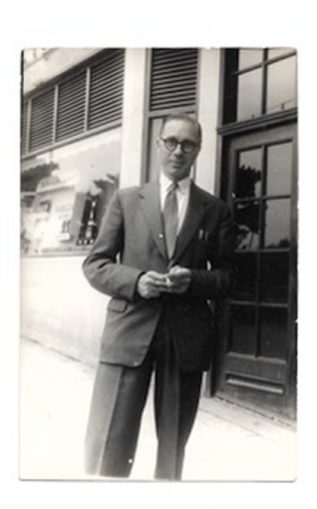
I was sent to a small Catholic primary school in Croydon which had both nuns and lay teachers. On the whole we were treated well – apart from one ruler-wielding nun who aimed for the knuckles or back of the legs – and I managed to pass my 11+ exam before moving on to a Catholic Grammar school for Boys in Purley. The school was approximately 2 miles away and since the family had no car I would walk there and back each day. Eventually I was given a bike (secondhand) and life got a bit easier. The school had a mixture of priests and lay teachers with a fair few of them having no educational qualifications. There was a “strapping” system in place throughout the time I was there. Any misdemeanours or breaking of the rules meant a boy would be handed a chitty from a teacher with “2” or “4” or “6” right up to the dreaded “double six”. At lunchtime there would be a queue of miscreants standing outside the strap room waiting their turn. Some faces were familiar and regulars who took it all in their stride, others were ashen faced who pleaded their innocence right to the moment the tawse slapped down on their shaking hands. In the seven years I was there I only had to receive the strap three times.
Sport was an important part of the curriculum and although I never made it into the rugby or athletics teams I did manage a full seven years in the football teams. The school was based on a House system named after various famous Catholic martyrs. My house was Fisher with a dark blue shirt to denote our House on the playing field. The school magazine issued twice yearly carried details of the various activities of the clubs and sporting prowess – or otherwise – of the various Houses. One particular year was memorable for the Fisher House Captain writing that his team had behaved like “cretins all” in their failed attempts to gain a place on the podium. I cherish that particular issue as one can only imagine the furore these days if an epithet like “cretin” was applied publicly in print to a pupil. Somehow we all survived the putdown.
Seven years of toil at the educational grindstone, a fleeting dalliance with the thought of taking up the priesthood (gratefully quashed by the neighbouring sirens of St.Anne’s Girls school) produced 6 O’levels and the princely sum of 1 A’ level (English). The failure at my other two A level subjects, Latin and History, was disappointing to say the least as both soaked up a vast amount of revision time. Whilst my History teacher was a useless regurgitator of notes I had expected to shine in Latin especially as my teacher had been Derek Enright who later became a Labour MP (and sang the first lines of the Beatles: Yellow Submarine in the House of Commons – in Latin). So what to do with 1 English A level? I had plans to join the Royal Navy as a midshipman and even went to the lengths of joining the Sea Cadets as a 16 year old in the hopes of gaining brownie points towards my application. I was sent on the Tall Ships race in 1966 aboard The Sir Winston Churchill which ran from Falmouth to The Skaw of Denmark. It was a memorable trip which ended with us finishing first in our class.
Unfortunately Dartmouth required at least two A levels at that time and my hopes of joining the RN faded fast. I made tentative enquiries of the Diplomatic Service and found, yet again, that I was one A level short. With my father breathing down my neck, expecting some kind of financial input into the house or even better some kind of movement out of it I answered an ad in the Evening Standard for book assistants at Foyles in the Charing Cross Road.
And so began my career in books of which I shall expand in the Second Honk.
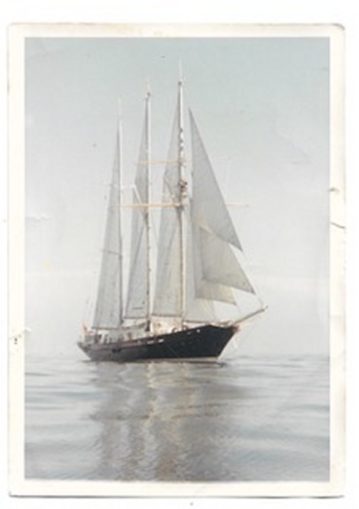
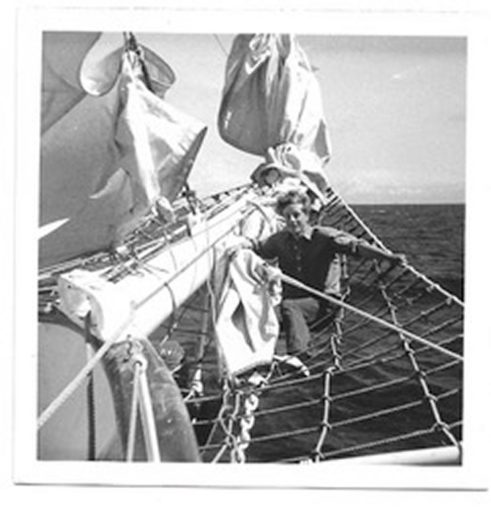
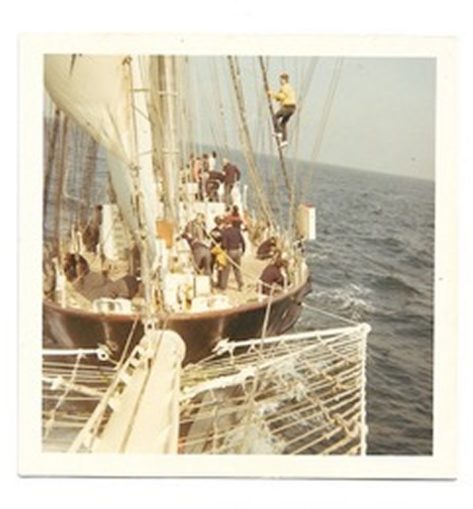
© Roger Ackroyd 2022


